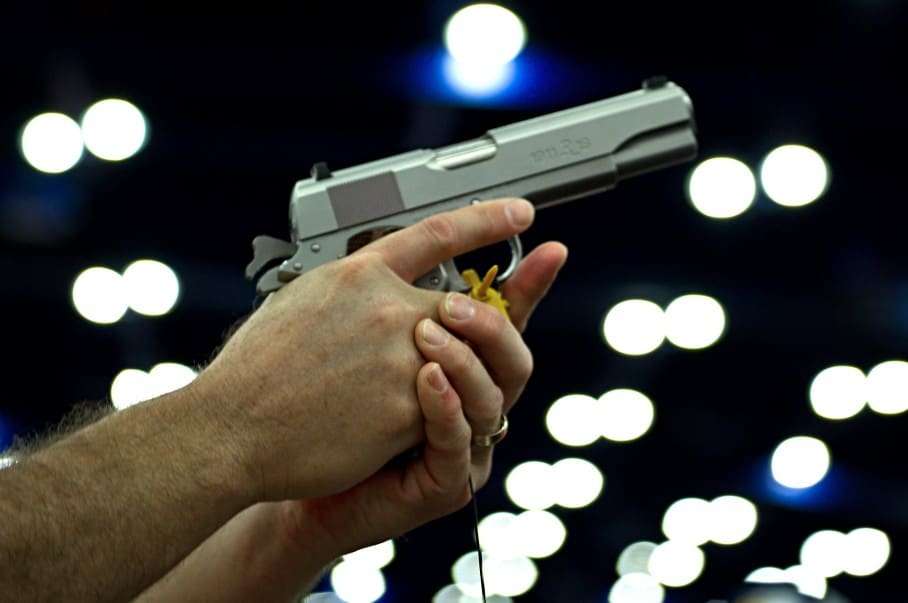The Volokh Conspiracy
Mostly law professors | Sometimes contrarian | Often libertarian | Always independent
No handgun for you -- you illegally possessed

Under Massachusetts law, anyone who has ever been convicted of any state or federal drug violation may not obtain a handgun. But a federal district court held last week that this rule violates the Second Amendment, at least as to someone with a minor 40-year-old marijuana possession conviction, given that Massachusetts has recently essentially decriminalized possession of small amounts of marijuana. An excerpt, from Richmond v. Peraino:
[Steven Richmond seeks] declaratory and injunctive relief requiring Defendant Michael Peraino, the Chief of the Hingham Police Department, to issue a License to Carry ("LTC") or a Permit to Purchase ("PTP"), allowing Richmond to possess a handgun in his home and to transport a handgun to a firing range … [despite] Richmond's forty-year-old conviction for simple possession of marijuana … [Text moved: [Richmond is not] arguing that he has a constitutional right to carry a handgun outside of the confines of the home.] …
The Complaint alleges that Richmond, in 1975, was convicted in Florida for simple possession of less than an ounce of marijuana, a misdemeanor for which Richmond paid a $252 fine and served no jail time. Richmond has not been convicted of a felony or any other criminal offense considered disqualifying for the purposes of obtaining an LTC. Today, Richmond seeks to purchase a handgun for self-defense in his home.
Richmond currently holds a Firearm Identification ("FID") card, which allows him to possess a rifle or shotgun in his home, but not a handgun. Richmond's LTC, which would allow him to possess a handgun in his home, was revoked by Peraino in 2014. [Footnote: The Complaint does not make clear the circumstances under which Richmond's LTC was originally granted.] The revocation was based on a [Massachusetts] statutory exclusion that prohibits [issuing a PTP or an LTC to] any person who "has, in any other state or federal jurisdiction, been convicted [of] … a violation of any law regulating the use, possession or sale of a controlled substance." …
This case is substantially identical to the facts presented in Wesson v. Town of Salisbury, 13 F. Supp. 3d 171, 178 (D. Mass. 2014), in another session of this Court. In that case, Judge Stearns entered a judgment in favor of plaintiffs, finding that their Second Amendment rights had been violated when they were disqualified from obtaining an LTC on the basis of a single, out-of-state conviction for simple possession of marijuana. I find Judge Stearns's reasoning in Wesson persuasive ….
… Although the level of scrutiny to be applied to Second Amendment challenges has not been definitively resolved by the courts, the First Circuit has held that "a categorical ban on gun ownership by a class of individuals must be supported by some form of 'strong showing,' necessitating a substantial relationship between the restriction and an important governmental objective."
In addressing this point in Wesson, the Commonwealth, which intervened in that case, noted that LTC applicants whose criminal record consists of a single violation, in Massachusetts, for possession of less than one ounce of marijuana are not generally disqualified from obtaining an LTC. This is so because, under Massachusetts law, a person convicted of possession of less than an ounce of marijuana, who has no prior convictions for a drug offense, "shall be placed on probation … [and] [u]pon successful completion of said probation, the case shall be dismissed and records shall be sealed." Mass. Gen. Laws ch. 94C, § 34.
Once sealed, the record of conviction, "shall not be deemed a conviction for purposes of any disqualification or for any other purpose." Further, as part of the decriminalization of possession of small amounts of marijuana in 2008, Massachusetts law was amended to prevent the Commonwealth, "any of its political subdivisions or their respective agencies, authorities or instrumentalities" from imposing "any form of penalty, sanction or disqualification on an offender for possessing an ounce or less of marihuana."
Accordingly, in Wesson, the Commonwealth conceded that had the plaintiffs been convicted in Massachusetts of simple possession of an ounce or less of marijuana, rather than having been convicted of that offense outside of the Commonwealth, they would in all likelihood not have been subject to the statutory exclusion from obtaining an LTC or PTP.
Because other individuals who had substantially identical convictions could otherwise be considered for and receive an LTC, the Commonwealth acknowledged that it could not argue that the disqualification was "'substantially related' to an interest in preserving public safety and preventing crime" and thus "d[id] not oppose a narrowly drawn declaratory judgment" that the statutory exclusions contained in ch. 140, §§ 131(d)(i)(E) and 131A infringed on the plaintiffs' "Second Amendment right to possess firearms in the home for self-defense." [Footnote moved: … Commonwealth has stated that the Wesson brief represents its position on the constitutional issue presented in this case.] …
With the foregoing in mind, it is ORDERED and ADJUDGED that Mass. Gen. Laws ch. 140, §§ 131(d)(ii)(E) and 131A as applied to Richmond infringe his Second Amendment right to possess firearms in his home. Peraino or his designate is hereby Ordered to give prompt consideration to any application for a License to Carry or Permit to Purchase filed by Richmond. Peraino is further Ordered not to apply Mass. Gen. Laws ch. 140, §§ 131(d)(ii)(E) and 131A as a basis to deny Plaintiff Richmond a License to Carry or a Permit to Purchase.
Sounds right to me.


Show Comments (0)